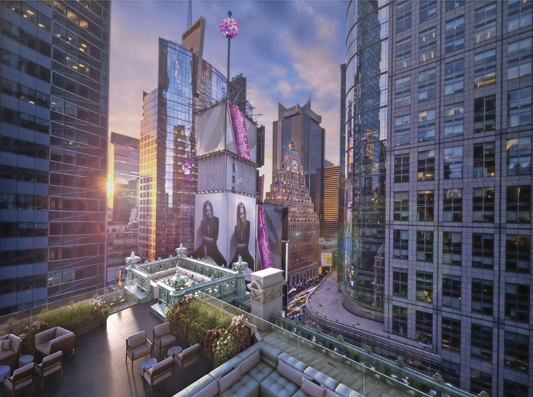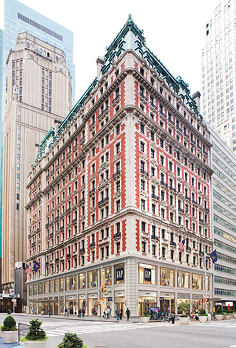


![]()
ONLINE

Times Square
Luxury
Editors’ Note
Jeff David was appointed to his current post in February 2013. He recently spent six years in various management positions with Viceroy Hotels & Resorts. His experience includes nine years with Four Seasons Hotels & Resorts. He has also served as the Food and Beverage Director at Rosewood Hotels and Resorts’ Little Dix Bay on Virgin Gorda in the British Virgin Islands. In addition, he was the General Manager of several distinct luxury New England properties, including the famed Chatham Bars Inn on Cape Cod, Massachusetts, and The Chanler at Cliff Walk in Newport, Rhode Island. David graduated with a Bachelor of Fine Arts from the University of California in Los Angeles and received his Certificate in Wine Stewardship from the Culinary Institute of America in Napa Valley. He was recognized as Hotelier of the Year in 2012.
Property Brief
Slated to open at the end of 2014, The Knickerbocker (theknickerbocker.com) will be a monument to New York’s coming of age. Originally opened in 1906 by John Jacob Astor IV, the hotel welcomed both glitterati and dignitaries, offering the first true multidimensional lifestyle experience. Registered as a New York City Landmark since 1988, the legacy of The Knickerbocker returns to the southeast corner of 42nd Street overlooking Times Square, between Broadway and Bryant Park, revealing an elegant, luxury lifestyle hotel offering 330 guest rooms, including 31 suites, a fitness center, a 2,200-square-foot event space for up to 250 guests, a ground level grab-and-go café, signature restaurant and bar, and a 7,500-square-foot rooftop bar and terrace with unrivaled views of New York City’s effervescent skyline.
What is the positioning for this property?
It’s time for luxury to insert itself into the area that we know as Times Square, a neighborhood which is both pedestrian and corporate heavy. There is definitely pent-up demand for more sophisticated offerings in this area.

The Knickerbocker landscaped rooftop
Was it important to maintain some of the history of the property and how do you make it modern?
You can’t replicate the history, so that is one key differentiator.
The contemporary appointments and timeless design is a sign of the times – we’re mimicking what Europe has been doing.
We’re going to have a high degree of guest comforts, including strong Wi-Fi and an emphasis on technology and fitness. The Knickerbocker is for today’s traveler, but we’re embracing the history, which is something that the majority of other hotels cannot offer, no matter how strong the brand or address. Not only were we populated by names such as Astor, Rockefeller, and Fitzgerald, but we’re home to where the Red Sox found out that the Yankees were going to take Babe Ruth.
The property appeals to the savviest of travelers who are seeking a multidimensional experience rather than just luxury amenities.
What feel have you established for the accommodations and the suite product?
We will have 31 suites and the average room type is going to be over 400 square feet, so already space is a key differentiator. The feel is serene and calm in contrast to our exterior surroundings.

The Knickerbocker exterior
Is it important to offer food and beverage, and how challenging is it to be successful with this?
Dining is more efficient and amenity-driven, especially in New York City. I’m seeing trends of simplicity, like four-ingredient dishes. It’s sustenance so if you do breakfast right, you’ve hit a home run in a hotel. Empty hotel dining rooms are definitely something you have to be aware of in this business. Creating an urban space that locals will patronize is key to your success.
What you can do to pioneer is listen to what the consumer wants. We’re currently seeing a trend in express breakfast, which is all grab-and-go delivery; a decline in fine-dining outlets; and a complimentary mini bar.
As far as breakfast, lunch, and dinner dining, we have an advantage because Times Square isn’t Tribeca or the Upper East Side, which has an incredible product offering at fantastic venues. We are located in a corporate playground that is yearning for clean, sophisticated, well-priced, and well-groomed dining offerings.
How significant is your focus on corporate meetings?
We have a wonderful meeting room, The Salon, which is over 2,000 square feet and can fit 250 people, allowing us to accommodate some great corporate meetings. Our rooftop overlooking Times Square is a venue you just cannot duplicate; suitable for both breakout lunches and breakout sessions.
How do you offer guests access to technology without losing the personal touch which is so important?
We have a tablet that controls all the room’s automation, changes channels, manages play-lists, etc. That will never replace the fact that we also have a traditional four-inch thermostat; on/off switches; an all-off switch; and a ‘Do Not Disturb’ sign. You have to accept the convergence of three generations, which is starting to become two with just Gen X and Millennials.
Guests used to come to hotels for the latest and greatest technology. Now that their residences offer this, hotels have to catch up to what is now status quo.
Would you discuss the importance of attracting top talent and investing in training?
The greatest companies have a strong mission, vision, and values. Putting the personal touch in place is really important. The fundamentals of talent begin with emotional intelligence and out-of-the-box thinking.
When there is synergy among the team, they’re unstoppable. This is where the training comes in. It’s important to instill an ethos that they’re part of a very special property.
Recruitment is also key; if you hire someone only for their resume and don’t account for professional synergy, then you’re hiring merely for compliance.
Is it challenging today to compete as an independent hotel?
No, our advantage is being independent. Actually, the big boxes are trying to carve themselves an independent slice.
Today’s guests are experience-driven; it’s about personal touch.
Has the proliferation of booking methods made it difficult to project occupancy levels?
Distribution is the single most evolving factor in the hotel business, especially with the presence of Google and iTravel. Platforms like Trip Advisor are the wave. Now AirBNB and Uber are in part of the vernacular. So the forecasting is tough. But I’m fortunate enough to be part of a city that runs at over 90 percent year-round.•